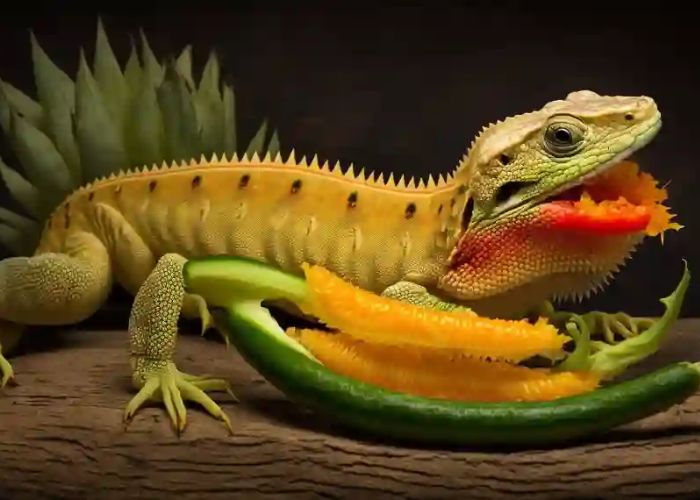Discover the many varieties of peppers, their health benefits, and whether or not bearded dragons may consume them in this comprehensive guide.
Learning What to Feed Your Bearded Dragon
Before diving into peppers, it’s important to understand what bearded dragons eat naturally. In the wild, these reptiles’ diet consists of a broad array of plant and animal items, including fruits, vegetables, and insects. Just like any other pet, bearded dragons need a well-rounded diet to stay healthy. Their development, growth, and overall health are aided by proper nutrition.
A Bearded Dragon’s Essential Requirements for Good Health
Bearded dragons need a varied diet of fruits, veggies, and protein-rich meals to stay healthy. They can’t survive without these vital nutrients:
Protein is essential for building muscle and stimulating growth. Insects such as mealworms, crickets, and Dubia roaches are common sources of protein.
The vitamins, minerals, and fibre found in vegetables make them a healthy food choice. Leafy greens like collards, kale, and mustard are always a good choice.
Fruits include both natural carbs and vitamins that the body needs. Berries, apples, and melons, when served in moderation, are quite OK.
Calcium and phosphorus are necessary for healthy bones. The ideal proportion of phosphorus to calcium is 2:1.
Vitamin D3 is crucial for calcium absorption in the body. Sunlight, namely ultraviolet B radiation, is essential for the synthesis of vitamin D3.
Peppers, an important part of the bearded dragon’s diet, will be examined in detail here.
Different Types of Peppers
Many different peppers, belonging to the genus Capsicum, are known for their unique flavours and health advantages. One example of a common sort is:
Bell peppers, or Capsicum annuum, come in a wide variety of colours. Bell peppers are slightly sweet and slightly spicy.
The capsicum frutescens family includes pepper species such as jalapeños and cayenne. They are hotter than conventional bell peppers due to the capsaicin in them.
Peppers, also known as capsicum annuum, sweet: Bell peppers and other sweet pepper varieties, such as cherry and banana peppers, are very similar. They are mild and sweet.
Nutritional Density of Peppers
Before feeding peppers to bearded dragons, it’s important to check their nutritional profile. First, I will give you a brief overview:
The immune system is kept robust by eating bell peppers, which are high in vitamin C.
There is an abundance of vitamins A and B6 in this meal.
People can eat them without guilt because of how few calories they contain.
Spicy red peppers:
There may be capsaicin, which has anti-inflammatory and analgesic properties.
Rich in vitamin A and vitamin C.
Its effect on human metabolism is well-documented.
Sweet peppers are nutritionally comparable to bell peppers.
Provide antioxidants that improve health in every area of life.
Can bearded dragons eat peppers?
Which peppers are safe for bearded dragons to eat depends on their nutritional composition and variety. Let’s examine each type independently.
The answer is yes, bearded dragons can eat bell peppers. Because of their high vitamin content, especially vitamin C, they aid in maintaining a healthy immune system.
Never give a bell pepper to a dragon without first removing its seeds and membranes.
To keep your nutrient consumption in check, moderately add them to a varied diet.
When considering feeding bearded dragons chilli peppers, it is important to proceed with caution. Some reptiles may not be able to withstand the heat, which is caused by capsaicin.
Because of their sensitive digestive systems, bearded dragons should avoid spicy foods.
Bell peppers and sweet peppers are extremely similar, so bearded dragons can eat either.
Get rid of the seeds and membranes to keep tummy troubles at bay.
Add sweet peppers slowly and observe your dragon’s reaction.
How to Prepare Ginger and Pepper for Bearded Dragons
Before feeding peppers to a bearded dragon, make sure they are thoroughly cooked. This is how it is done:
Rinse the peppers under running water to eliminate any pesticides or other contaminants.
It is recommended to remove the seeds and inner membranes because bearded dragons may have trouble digesting them. Prior to serving the peppers, attend to that matter.
Chop into small pieces: Check that the pieces are small enough for your dragon to comfortably eat.
Variety Appreciation: Though they shouldn’t be fed constantly, dragon peppers can be a nutritious addition to your pet’s diet. You can meet their nutritional needs by offering a variety of vegetables and insects.
Caution and Considerations
Bearded dragons can benefit from eating peppers, but there are a few things to remember while feeding them:
Peppers, like any other food, are best eaten in moderation. A varied diet is the greatest approach to give your bearded dragon the nutrients it needs to thrive.
Never Let Your Dragon Go Unattended: See how your dragon responds to different foods by keeping a close watch on it. If it starts acting sick, stop giving it food and take it to the vet.
Reduce Your Exposure to Spicy Flavours: Because of their sensitive digestive systems, bearded dragons should not be fed hot peppers.
Being on Time is Essential: Serving peppers that are fresh will maximise their nutritional worth. Discard any uneaten food if you would like to prevent the growth of microorganisms.
To sum up
Finally, some peppers are OK for bearded dragons to eat as part of a varied and balanced diet. Bell peppers and sweet peppers are rich in antioxidants and vitamins when fed to dragons in moderate amounts and cooked correctly. However, great care is required while handling spicy peppers due to the capsaicin they contain.
In order to find the finest food for their bearded dragon, pet owners should educate themselves on the species’ specific dietary needs and keep a close eye on their health and eating habits. Consulting a veterinarian with expertise in reptiles is the surest approach to guarantee the well-being of your bearded dragon. They are able to give you tailored recommendations.

Maykon Alvarenga is a seasoned pet care expert with over 8 years of experience in the field. He holds a Master’s degree in Veterinary Science, specializing in small animal care. His passion for pets is reflected in his work on PetsBent.com, where he shares valuable insights on pet health, behavior, and training. Maykon is dedicated to helping pet owners provide the best care for their furry friends. Connect with him on Instagram at @maykon.alvarenga for more tips and updates.

